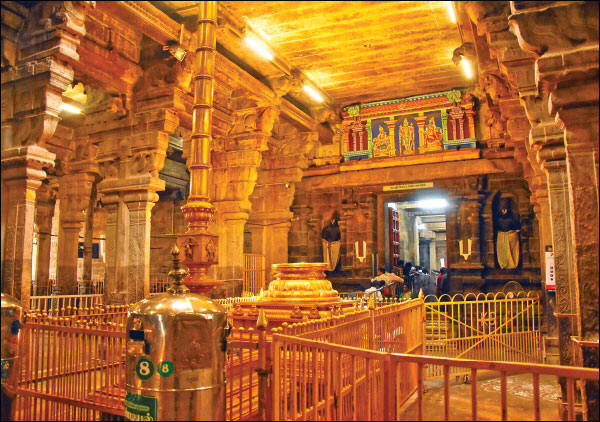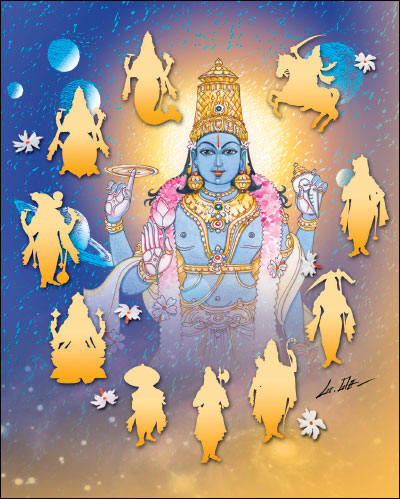Posted Date : 06:00 (23/10/2018) October 23, 2018 Sakthi Vikatan
Author: Indira Saundarrajan Images: N.G.Manikandan
Here is a conversation between the Parrot King and the Ṛṣi.
Ṛṣi: If all claim the mantle of the king, who will rule the country? Emperuman creates diverse kinds of people. to avoid such a predicament.”
Kiḷi Cholan (parrot King Cholan) gave a clear answer.

The king: “If everyone is a king, no one person can rule. There can be only one king for a country. Likewise, if all are virtuous people, there will not be any variation. I did not realize it.”
Ṛṣi: For you to understand it, I said so. Our actions determine and define the high and the low, the differences and disparities. Compassion, love, and affection are common to all. Bravery, wealth, education, wisdom and the like depend on individual efforts. The Upadēsas (Spiritual instructions, advice) tell us to show love to all and live with compassion.
Ṛṣi: “Otherwise, there is bound to be a disparity. Only those circumstances that prevail then should be under consideration. The current situation should not become permanent. It is wrong and unethical to extend love, compassion and affection contingent upon the prevailing situation.”
The king understood and expressed his gratitude to the Ṛṣi.
The king: “Please tell more about the greatness of the other Avataras.”
The Nīlivaṉa Ṛṣi narrated the greatness of Avataras.
Ṛṣi: Emperuman taught a lesson to Asura the Golden-Robed (Hiraṇyakaśipu) who thought of himself as the Parabrahmam greater than Emperuman. That came as a lesson to him from his son himself. The Golden-Robed met his death according to his Varasiddhi (Conditions of his boon). The Annihilator was Narasimha the personification of rage himself. (It was a death by default because his conditions had a limited scope. The Lord went above and beyond the scope of the conditions of Hiraṇyakaśipu's boon.)
The king: “Now a question for you.”
Likewise, the Devas and the Asuras! The world Māyā tries to convert the good into the bad. Those who came in the Raudra style of life, do not think beyond their intellect. The can’ do it. They come back like the ball bouncing off the wall.

The king: “If that is so, are the Avatar's objects to control, go to war and destroy them?”
Ṛṣi: Yes. The basic tenet is to teach lessons to the world people.”
The king: "Mahaṛṣi! As you talk about Emperuman, I feel the ecstasy more and more. I am happy that the discovery and rehabilitation of the temple are taking place. I desire this temple should continue offering grace-service.” He asked the ṛṣi to explain to him the Greatness of Avatara. The Ṛṣi agreed to do it and offered advice.
Ṛṣi: “Chola king! I will describe it expansively. It is not enough that you know about it. All the visitors to the temple should know it. Their mind and soul melt and get close to Emperuman.”
The king: “What should I do to achieve it?”
Ṛṣi: “Make arrangements for Puranic experts to give talks. Build a Mandapam and an open space auditorium for the people to sit and hear the lectures.”
The king: “Good suggestion.”
Ṛṣi: “Build a water Pandal and a dining hall for those who come to the temple after a long walk with aching feet, parched tongues and hungry stomachs. Likewise, establish a separate administrative department for the temple and build houses near the temple for the Veda Pandits.”
“Understand that there are differences between the kingdom’s administration and the temple administration. Before Emperuman’s presence, the prince and the pauper are equal. There is no greater or lesser man here.”
The king: “Mahaṛṣi, I understand. This moment I begin implementing your suggestions.”
Kiḷi Cholan according to the ideas of the Mahaṛṣi, brought about improvements and changes. Because of the parrot, the king discovered Namperuman. He built a Parrot Mandapam with nesting spaces for them.
It was called Kiḷi Mandapam. Following the recommendation of Mahaṛṣi, opposite to the Kiḷi Mandapam Arjuna Mandapam was built for the Paurāṇikas to tell the Puranic stories to the devotees and visitors. On the pillars of the Mandapam, there were setups for oil-fed torches. Chekkāḷaṉ (Oil replenisher) filled the lamp reservoirs. Thīkkāḷaṉ (Torch Lighter) made his rounds lighting up the oil torches. They received grain subsidies.
On special days, Paurāṇikas performed recitation of Puranas. There were permanent fixtures like podium stands and lamps. The Paurāṇikas came in palanquins. The temple gave them the deity-used Araṅgaṉ silk as a conditional grant. Besides that, the devotees gave as gifts gold and objects to the Paurāṇikas. On Vaikunta Ekadasi, in the early morning, they held Kālakṣēpa (Religious discourse with songs). The king attended these talks and became conversant with Tiruvaraṅgaṉ’s five states.
The first state is Parabrahma state. In this state, Paramātma is the First and Last, and we are his creations: Jīvātmās.
None of us will ever know the Parabrahman. That Parabrahman as Mahavishnu appears reclining on the snake bed in the Milk Ocean. This state is Vyūka. When the Devas and humans suffer hardship and misery, Emperuman to remove their hardships comes down as an Avatara. This Avatar manifestation is Vibhavam. This Parabrahman is a resident of all from the fly and ant to our heart. There is no place he is not. This state is ‘Antaryāmi.’
Though we may learn profoundly of these four states, we will not know them wholly. Our limitation is we are unable to show our devotion and know it intimately. For our benefit and commensurate with our immaturity and ignorance, he presents himself with his beautiful holy body and offers grace and Darśan. That is the fifth state: Archa state. Though he has Archa state, all cannot have the idols in their homes for worship. Beginning from economic hardship to other extenuating circumstances, we forget ourselves often. That is why temples came into being. Temple worship is Parārtha (= That intended for the benefit of others.) Individual worship done at home is Ātmārttam (= For one's own sake). Parārtha worship has multiple ways and variations.
The temple tower and tower worship are of equal importance. The Darśan of the Gopuram brings 10 million merits.
Balipīdam (altar) is at the entrance to the temple. We fall prostrate and relinquish our base qualities then and there and enter the temple with a clean mind and qualities.
The next one is the Flagpole! It connects with the heavens, draws the powers to itself and offers it to the temple. Here too, we should offer our homage and worship. The next one for worship is the Vāhaṉam (The vehicle for the deity), which augments and sharpens the thoughts of the main deity. The next step is to go to the Sannidhi. The doors of the Sannidhi open, Emperuman appears in his divine regalia, and the waving of the lighted camphor before Emperuman takes place.
Our Jīvātmā is like the bright camphor flame. Paramātma Emperuman also is one flame. The waved camphor flame is between the said two flames (of Jīvātmā and Paramātma). The Jīvātmā flame merges with the camphor flame, and these combined flames merge with the Flame of Paramātma and all become one Flame. We have taken birth to merge in the like manner. These rituals are like practice runs. In the state of a temporary merger of Jīvātmā and the Paramātma flames, the concurrent bell sounds prevent and drown out extraneous thoughts in our mind. Nādam is the name for the sounds of the bell.
The sound of the bell, the Sannidhi scene, and the perceived objects are like a remedy (for the soul). Having taken the medication, it is essential that the devotee finds a neat sitting place outside the temple and perform meditation: That is to create oneness of the mind. Because of these factors and without our awareness, regular breathing, regular heartbeats, the adequate blood flow in the blood vessels and the body kinetics are within physiologic range.
As the body and the mind are in unison, Jīvātmā enjoys a unique experience.
Will continue.